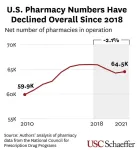(Press-News.org) Today, women with oestrogen-sensitive breast cancer receive anti-hormonal therapy. Researchers now show that postmenopausal women with low-risk tumours have a long-term benefit for at least 20 years, while the benefit was more short-term for younger women with similar tumour characteristics who had not yet gone through the menopause. The results are reported in the Journal of the National Cancer Institute (JNCI).
In Sweden, 9 000 women are diagnosed with breast cancer each year, with hormone-sensitive breast cancer accounting for about 75 percent of women diagnosed with the disease. In patients with hormone-sensitive breast cancer tumour growth is mainly driven by oestrogen and patients are therefore treated with oestrogen-suppressing drugs, often tamoxifen. However, anti-hormonal treatment reduces quality of life and the question has been how the long-term benefit against recurrence looks like. About a third of women diagnosed with breast cancer are younger and have yet not undergone the menopause, i.e. they are premenopausal, and are known to have an increased risk of recurrence.
“Younger women generally have a higher risk of recurrence than older postmenopausal women, but most studies on anti-hormonal therapy have mainly included postmenopausal women. We therefore wanted to compare the long-term benefit from the treatment in both groups,” says Linda Lindström, associate professor and research group leader at the Department of Oncology-Pathology, Karolinska Institutet, who led the study.
The study includes more than 1,200 women diagnosed with hormone-dependent breast cancer between 1976 and 1997 of which almost 400 were premenopausal. At the start of the study it was not known whether anti-hormonal treatment was beneficial and therefore women were randomised to treatment with tamoxifen for at least two years or no anti-hormonal treatment, i.e. the control group. The outcome of interest was breast cancer metastasis or distant recurrence and today there is follow-up data for more than 20 years after initial diagnosis.
“From the regional breast cancer registry, we have an almost complete follow-up on all patients and this together with a control group who did not receive anti-hormonal treatment makes the study unique. There is also complete data on whether the women were pre- or post-menopausal at diagnosis, which is otherwise often estimated based on age,” says Annelie Johansson, researcher at the same department and the study's first author.
The women's tumours were classified as low or high risk based on the clinically used markers. Low risk tumor characteristics were defined as a tumour size of two centimeters in diameter or less, no lymph node spread, low tumour grade, being positive for the progesterone receptor, and a low genomic risk, which was determined by a molecular signature that measures the expression of 70 different genes.
Women with high-risk tumours had less benefit against distant recurrence, whether they had gone through menopause or not. Women with low-risk tumours after menopause had a long-term benefit of 20 years or more. For younger women who had not gone through menopause at diagnosis, a long-term benefit could not be predicted using the clinically used markers. Therefore, new markers are needed, the researchers say.
“We need to work further to understand which tumour characteristics influence the long-term risk of recurrence and benefit in younger patients. We want patients to benefit from their treatment for as long as the risk of recurrence is elevated,” says Linda Lindström.
In the next step, the researchers want to be able to link more complex tumour characteristics to the long-term risk and benefit of anti-hormonal therapy, in order to individualise the treatment to the patients who benefit from it.
“For example, we plan to perform multi-protein analyses and use machine learning for image analysis of breast cancer tumours to understand more about tumour heterogeneity - i.e. differences between and within tumors - and how it affects risk and treatment benefit,” says Linda Lindström.
The study is funded by the Swedish Research Council, the Swedish Cancer Society, the Stockholm Cancer Society, ALF medicin and the Gösta Milton Foundation. No researchers at Karolinska Institutet report conflicts of interest, others are reported in full in the study.
Publication: "Differential Long-Term Tamoxifen Therapy Benefit by Menopausal Status in Breast Cancer Patients: Secondary Analysis of a Controlled Randomised Clinical Trial", Annelie Johansson, Huma Dar, Anna Nordenskjöld, Gizeh Perez-Tenorio, Nicholas P Tobin, Christina Yau, Christopher C Benz, Laura J Esserman, Laura J van ‘t Veer, Bo Nordenskjöld, Olle Stål, Tommy Fornander and Linda S Lindström. Journal of the National Cancer Institute, online ?? 2024. doi: 10.1093/jnci/djae268
END
Long-term benefit from anti-hormonal treatment is influenced by menopausal status
2024-12-04
ELSE PRESS RELEASES FROM THIS DATE:
Most of growth in high intensity hospital stays not explained by patient details
2024-12-03
In five states over nearly a decade, hospitals have increased how frequently they document patients as needing the highest intensity care, which has led to hospitals receiving billions in extra payments from health plans and government programs, according to a new RAND study.
Among thousands of cases involving hospitals stays for 239 conditions, researchers examined how often hospitals upcoded patients to the sickest end of the care spectrum, where hospitals charge payers at the highest rate.
The study found that from ...
OHSU study in neurosurgery patients reveals numerical concepts are processed deep in ancient part of brain
2024-12-03
New research reveals the unique human ability to conceptualize numbers may be rooted deep within the brain.
Further, the results of the study by Oregon Health & Science University involving neurosurgery patients suggests new possibilities for tapping into those areas to improve learning among people bedeviled by math.
“This work lays the foundation to deeper understanding of number, math and symbol cognition — something that is uniquely human,” said senior author Ahmed Raslan, ...
Predicting cardiac issues in cancer survivors using a serum protein panel test
2024-12-03
(MEMPHIS, Tenn. – December 3, 2024) Early disease detection is beneficial for securing the best possible outcomes for patients. But finding noninvasive, effective ways to predict disease risk is a tremendous challenge. Findings from scientists at St. Jude Children’s Research Hospital are showing promise for assessing cardiomyopathy risk in childhood cancer survivors. Heart disease is a well-established late effect for pediatric cancer survivors treated with anthracycline chemotherapy. The researchers identified a panel ...
Research on neurodegeneration in spider brain leads Vermont neuroscientists to groundbreaking new discovery in Alzheimer’s-affected human brains
2024-12-03
COLCHESTER, VT – Researchers from Saint Michael’s College and the University of Vermont have made a groundbreaking new discovery that provides a better understanding of how Alzheimer’s disease develops in the human brain.
Guided by previous research of spider brains, the scientists uncovered evidence of a “waste canal system” in the human brain that internalizes waste from healthy neurons. They discovered that this system can undergo catastrophic swelling, which leads to the degeneration of brain tissue, a hallmark of Alzheimer’s disease.
With over 50 million affected people worldwide, Alzheimer’s ...
Nearly 1 in 3 retail pharmacies have closed since 2010
2024-12-03
Key study findings:
The rate of pharmacy store closures in recent years has more than doubled, affecting about 1 in 3 pharmacies between 2010 and 2021 and contributing to an unprecedented decline in the availability of pharmacies in the U.S
About one-third of counties experienced an overall decline in pharmacies, and the risk of closure was higher in predominantly Black and Latino neighborhoods.
Independent pharmacies, often excluded from networks by pharmacy benefit managers, were more than twice as likely to face closure compared to chain pharmacies.
Policymakers should consider several ...
‘Alaska’s Changing Environment’ — a new report
2024-12-03
The University of Alaska Fairbanks released a new report this week highlighting environmental changes and extremes that impact Alaskans and their livelihoods.
“Alaska’s Changing Environment” provides people with timely, reliable and understandable information on topics ranging from temperature and precipitation changes to salmon and polar bears.
The report was led by the Alaska Center for Climate Assessment and Policy at the UAF International Arctic Research Center, with contributions from more ...
nTIDE Deeper Dive November 2024: Employment trends highlight strength of veterans with disabilities
2024-12-03
East Hanover, NJ – December 3, 2024 – Veterans with disabilities continue to outperform the general population of people with disabilities in employment rates, highlighting the possible impact of specialized training and participation in essential industries, according to a new analysis shared during a National Trends in Disability Employment (nTIDE) Deeper Dive Lunch & Learn Webinar held on November 22. nTIDE is a joint effort by Kessler Foundation and the University of New Hampshire’s Institute on Disability (UNH-IOD).
Despite ...
Truck drivers need tailored health supports to Keep on Truckin’
2024-12-03
It might seem out of place on the side of a highway, but purpose-built exercise equipment installed at truck stops across Australia could be just the thing to encourage truck drivers to take a break and take control of their health and wellbeing.
In the first meta-analysis of how health behaviour interventions can affect truck drivers, researchers at the University of South Australia have found that tailored, multi-level and innovative approaches to truck driver health are required to enact positive change, as current interventions are not working.
Reviewing the effectiveness of health interventions for more than 2000 truck drivers across 19 studies, researchers found ...
Gluing treatment to cancer
2024-12-03
Treatment for more advanced and difficult-to-treat head and neck cancers can be improved with the addition of polyvinyl alcohol (PVA), the same ingredient used in children’s glue. Researchers found that combining PVA with a boron-containing compound, D-BPA, improved the effects of a type of radiation therapy for cancer, compared to currently clinically used drugs. The PVA made the drug more selective of tumor cells and prolonged drug retention, helping to spare healthy cells from unnecessary radiation damage.
Japan became the first country to approve boron neutron capture therapy (BNCT), a type of targeted radiotherapy for cancer, in 2020. Doctors ...
Oana Cojocaru-Mirédin of the University of Freiburg receives ERC Consolidator Grant
2024-12-03
Materials scientist Prof Dr Oana Cojocaru-Mirédin of the University of Freiburg has been awarded a Consolidator Grant from the European Research Council (ERC). With this grant, the European Union (EU) is funding her research project on the properties of what are known as grain boundaries in crystalline materials, such as those used for solar cells. The grant is among the most prestigious funding programmes for scientists in the EU. It provides almost two million euros for a five-year period. This ...







